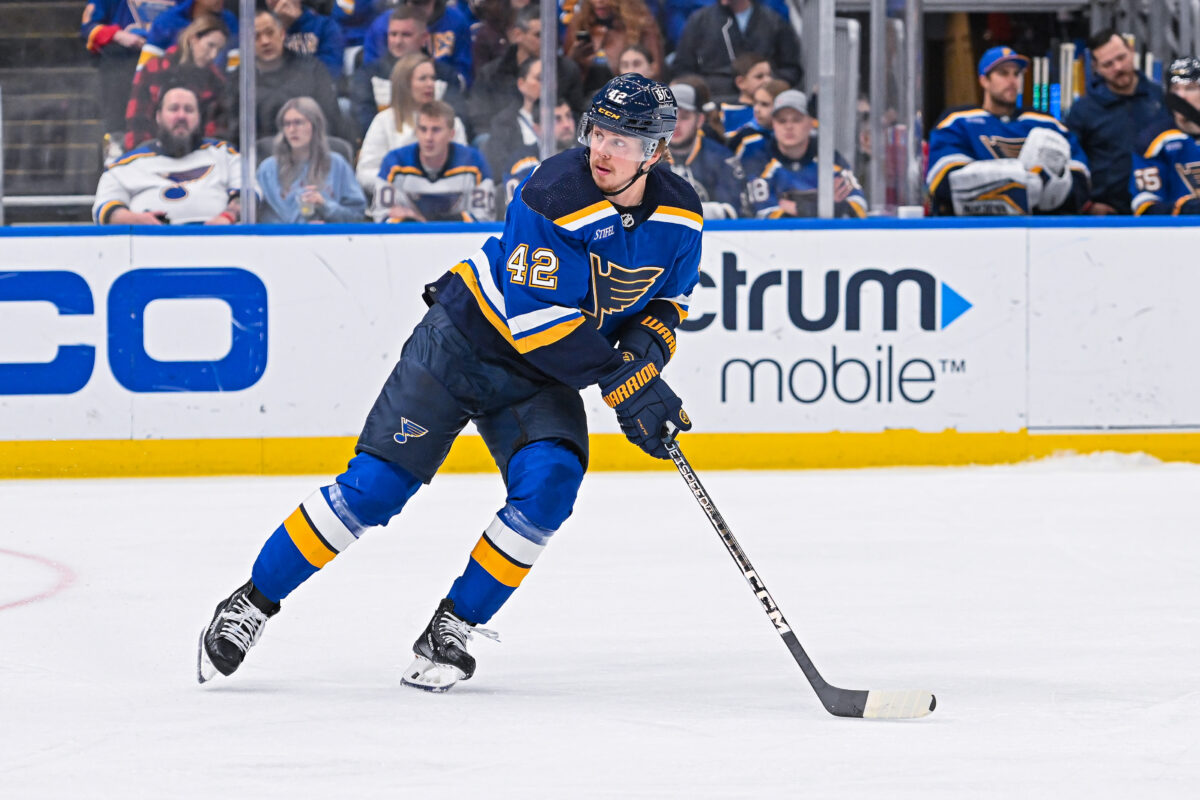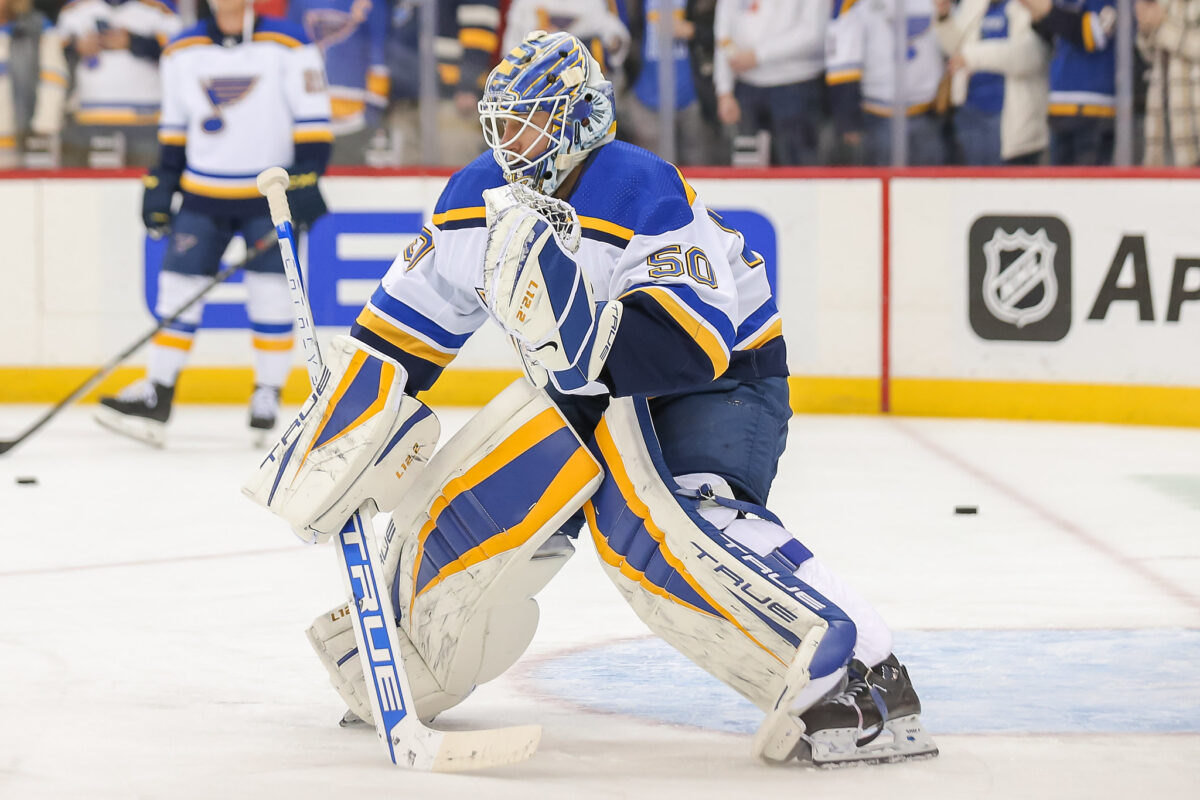The St. Louis Blues’ season officially ended with their 2-1 shootout loss to the Dallas Stars on Wednesday night. A roller coaster ride that included an early season coach firing, several bad losses to some of the worst teams in the league, and a late season playoff push that fell just short officially came to a close as the Blues missed the playoffs for the second straight season, finishing with 92 points. The team will finish, at worst, seven points away from a playoff berth. Although the season was a step up from the previous season, with an 11-point improvement, the Blues still have some holes to fill heading into the summer if they want to jump back to the postseason. The offseason will be fascinating as general manager Doug Armstrong will have to make several crucial decisions on the roster to try and bring the Blues back to the playoffs. However, looking back at this season, several factors played a big part in why they will sit at home this summer instead of competing for a Stanley Cup.
Lack of Secondary Scoring
Throughout this season, whether under former head coach Craig Berube or the current interim head coach Drew Bannister, the Blues struggled mightily to score. Although Bannister improved the power play unit from dead last in the league to the middle of the pack, the scoring at even strength was still hard to watch at times, with the Blues finishing near the bottom of the league in even strength points. However, when looking at this roster, there were few options to turn to when stars Robert Thomas and Jordan Kyrou were not scoring. At last season’s trade deadline, Armstrong brought over Jakub Vrana from the Detroit Red Wings and claimed Kasperi Kapanen off waivers from the Pittsburgh Penguins to potentially give the team a spark at the end of the season, and they did just that. In 20 games last season, Vrana had 14 points, 10 of which were goals, and Kapanen also totaled 14 points in his 23 games.
Although it was a short sample size, both showed promise to potentially be a part of the team’s middle six this season, coming off a solid end to the 2022-23 season. While neither appeared to be a long-term solution for the Blues’ roster, there was a strong belief that both players could provide stability and secondary offense in the middle of the lineup this season. With the losses of Vladimir Tarasenko, Ryan O’Reilly, David Perron, and Ivan Barbashev over the last two seasons, the Blues’ top nine came into the season significantly lacking talent. Vrana and Kapanen were considered stop-gap options to provide 30-40 points and give some offensive help to budding stars Thomas and Kyrou.
However, the two could not find their footing this season. Vrana played only 21 games before being placed on waivers and sent down to the Blues’ American Hockey League (AHL) affiliate, the Springfield Thunderbirds. Kapanen was healthy scratched on multiple occasions and saw his role diminish to a bottom-six forward. At the same time, players like Alexey Toropchenko and Zachary Bolduc saw top-six minutes down the stretch.

However, the lack of offense does not just fall on two failed experiments, as veteran players paid high dollar amounts did not contribute as top-end performers consistently during the season. Both captain Brayden Schenn and veteran winger Brandon Saad finished the season strong with 45 and 42 points, respectively. Still, several weeks during the season, both players had significant scoring droughts that cost the Blues crucial points. Meanwhile, the offseason addition of Kevin Hayes, who was healthy scratched three of the last five games, backfired drastically as he only totaled 29 points in 78 games this season, his lowest point total in a full season of his entire career.
Given the roster’s lack of scoring, the team put a lot of pressure on Thomas and Kyrou to carry the load offensively, and both played well this season. Thomas finished with a team-high 86 points in 81 games while leading all forwards in ice time and consistently playing against the opposing team’s best players. He cemented himself as a superstar in this league and will continue to grow. Kyrou received a lot of criticism for his play this season, and rightfully so; he did tend to disappear at times early on in the season, but No. 25 turned his game around the last three or four months, finishing with a team-high 31 goals and 67 points. His game transformed into a more complete style of play over the season’s final stretch, and he found confidence in his shot again, which is an excellent sign for the Blues moving forward. However, these two can’t carry the offense by themselves and will need more help from other linemates moving forward if this team wants to be successful.
The emergence of Jake Neighbours as a legitimate 30-goal scorer and an entire season of Bolduc, who looked promising during his 24 games this season, will help cement the top six for the foreseeable future. Even with Jimmy Snuggerud returning to the University of Minnesota and not joining the Blues roster until potentially late next season, the team has a lot of young pieces that can help provide a spark to a struggling offense next season. However, this season, the mixed bag of several underperforming veterans at the top of the lineup kept this Blues team from making the playoffs.
Playing Down to Bad Opponents
When looking at where the Blues ended the season in the standings, finishing at worst seven points back of a playoff spot, it is tough not to notice the number of opportunities missed to gain points against the bottom ten teams in the NHL this season. There is no question that every team is hard to beat in the NHL, regardless of their record, but the playoff teams use their games against the non-playoff teams to add points and gain traction in the standings. This season, the Blues failed to do that on several occasions. With two losses to the San Jose Sharks late in the season and three losses to them in total, while also dropping two games to the Columbus Blue Jackets and one to the Chicago Blackhawks, all are crucial points against the bottom five teams that the Blues failed to take advantage of.
Related: 3 Players Who Can Take Jimmy Snuggerud’s Spot on the Blues’ Roster
The fascinating part is the Blues played incredibly well against playoff teams this season, rattling off several victories against high-end opponents like the Edmonton Oilers and Vancouver Canucks. Consistency was a significant problem for the Blues this season as the team failed to generate any significant winning streaks and was hardly the same team night in and night out. The lack of game-to-game consistency, especially early in the season, prevented the Blues from garnering momentum during several games, missing out on pivotal points that turned out to be costly late in the season. If the team had capitalized on these matchups earlier in the season, they would not have found themselves to be chasing late in the season for a playoff spot.
How can the team fix this issue moving forward? Firstly, having stability behind the bench will be crucial for the team next season. While Bannister did many good things for the Blues in the interim, he came into a challenging situation. It took some adjustments throughout the season to finally get the roster clicking, and by the time the team was playing good hockey, there were a lot of missed point opportunities that were too much to catch up on. Filling the holes on the roster will also help with consistency issues.
When players play too far up in the lineup and play roles their skillset is not made for, it causes significant problems in performance, and for the Blues this season, that showed. If Armstrong can find a way to add complementary pieces to the offense in the summer, the team could regain its footing and surge to the postseason.
Too Much Reliance on Goaltending
It is no secret that Jordan Binnington was nothing short of spectacular this season for the Blues. He finished fourth in the league in goals saved above expected (GSAA) and fourth in wins above replacement (WAR) among goalies this season. Finishing with a 28-21-5 record and a .913 save percentage (SV%), he was by far the most consistent player for the Blues this season. Although the record might not indicate it, and his leaguewide reputation will cause several to try and minimize his play, there is no denying that he was one of the best goaltenders in the league and should get some Vezina votes.
What truly made the difference for the Blues was the steadiness behind Binnington on the bench in rookie goaltender Joel Hofer. In his first full season in the NHL, he was as good as anyone could expect a 23-year-old goaltender to be. He finished the season at 15-12-1 with a 2.65 goals-against average (GAA) and a .914 SV% and helped take the load off of Binnington, who is usually near the top in games played every season he has been in the league.

Unfortunately for the Blues, as great as the goaltending was this season, it was not enough, not because of the play of the two goaltenders between the pipes, but because the consistency in front of them was not good enough on a nightly basis to win games when it mattered. Regardless of how great Binnington or Hofer was each night, the offense couldn’t generate consistent chances to score or keep possession of the puck every night. When that happens, winning games can be challenging, which was evident during the season for the Blues. The goaltending was outstanding all season long and kept the team in many games, but when the offense couldn’t capitalize on the number of low-scoring games, both Binnigton and Hofer kept them in all season.
This level of consistency goes hand in hand with the two reasons mentioned earlier—the lack of scoring production from the second tier of players on the roster and the lack of consistency in all games this season, especially those against below .500 opponents led to the team coming up short of the playoffs for the second season in a row.
There are a lot of things to be excited about for this team moving forward, and the strides they took from this season from last season are pushing the franchise in the right direction for the future. With the additions of Snuggerud, last season’s 10th overall selection Dalibor Dvorsky, and the continued development of Bolduc and Zach Dean, the future is bright for the Blues. However, the team still has a lot of growth to do if it wants to make a playoff push next season. This offseason is pivotal for Armstrong and the management team to steer the franchise back into winning ways.
